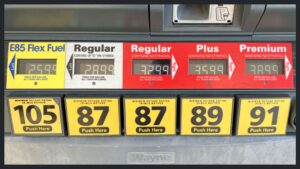
Ethanol vs Non-Ethanol Gas (Which is Better?)
Are you putting the right fuel in your car? When you visit a gas station, you have many different types of gasoline to choose from. In addition to the octane rating, some fuels release different levels of ethanol.
Although most gasoline sold in the United States contains more than 10 percent ethanol, non-alcohol or “clear gas” is still an option. Although both fuels are suitable for use in most gasoline engines, here are some differences you should be aware of when you fill up. What is ethanol? Ethanol (also known as ethyl alcohol) is a type of grain alcohol, usually made from corn. Although most ethanol is made from corn, it can be made from almost any plant. Sometimes they are made from sugar, grass, or fruit.
What are the benefits of using hydrocarbons? Ethanol has many advantages over regular gasoline. Here are some of the major benefits of using gasoline over clean air.
1) Renewable materials (better for the environment)
Ethanol is better for the environment than pure gasoline. Ethanol is not only renewable, but it burns more efficiently than gasoline and has the least harmful emissions.
2) High octane number
Ethanol is rated at around 100 AKI, which is higher than the 93 AKI you find at gas stations. A higher octane rating means it is more capable of burning under pressure. Your car is less likely to crash when using higher octane fuel.
3) Reducing dependence on foreign oil
Humans can produce hydrocarbons. In many places, it is legal to make your own alcohol. The government’s plan to introduce ethanol into the fuel supply will significantly reduce dependence on foreign oil. This will help reduce fuel costs during the recession.
4) Low operating temperature
Ethanol operates at lower temperatures than pure gasoline. Because the energy content is lower, more fuel is required. Adding fuel increases the air-fuel ratio, which cools the combustion chamber.
E85 is a fuel that contains 85% ethanol and 15% gasoline. The combination of a higher octane rating and a lower operating temperature make E85 an attractive choice for most applications. By using fuel with a high ethanol content, race cars can be tuned to produce more power. E85 is cheaper than race fuel.
5) Cheaper
Ethanol yields are very low. Using fuel that contains ethanol will help you save money at the gas pump. Carbon-free gasoline costs $1-2 more per gallon than standard E10 gasoline.
What are the disadvantages of using hydrocarbons?
Sometimes, ethanol may not be good for you. Here are some reasons why you may want to avoid using ethanol in your pump.
1) It has lower energy content than gasoline
Ethanol is 40% less fuel efficient than gasoline. Since most gas stations dispense E10 by default, this means that the fuel is 4% less efficient than non-carbon gas. When you use a fuel that contains hydrocarbons, you will see a slight drop in fuel economy.
2) Possible corrosion in the carburetor fuel system
Although ethanol is non-corrosive, it does absorb moisture. This moisture can cause corrosion in older fuel systems that were not designed with ethanol in mind.
This problem usually only occurs in older vehicles. All buildings built in the last 30 years can use E10 fuel without any long-term problems. Fuel system corrosion is a common problem on older carbureted engines.
3) Life is short
Because ethanol absorbs moisture, its shelf life is not as long as that of pure gasoline. If you want to charge your lawnmower or other garden tools, you should consider using compressed air instead of E10. During the off-season, these devices are not used for months. Is ethanol good for your car engine?
In general, if your car is designed to run on ethanol, it is good for your engine. Modern cars with gasoline engines are designed to run on E10 without any problems for a long time. However, be careful not to use higher levels of ethanol unless you are driving a Flex Fuel vehicle.
What is soft fuel? Flex Fuel is a vehicle designed to use gasoline with different ethanol grades, from E0 to E85 (including E100 in some countries).
Flex fuel vehicles have many ECU adjustments with ethanol sensors. The ethanol sensor determines the ratio of ethanol to gasoline, and the ECU uses this data to select the best map for the type of fuel in the tank.
Brazil is one of the largest producers of ethanol, and many gas stations offer 100% ethanol. Many Flex Fuel vehicles sold in Brazil are designed to use this fuel efficiently.
Ethanol is everywhere in our fuel structure, but it’s nothing to be afraid of. As research and development of synthetic fuels increases, the amount of ethanol available in new fuels may change. Since your vehicle is designed to run on ethanol, you don’t have to worry when choosing non-E10.

